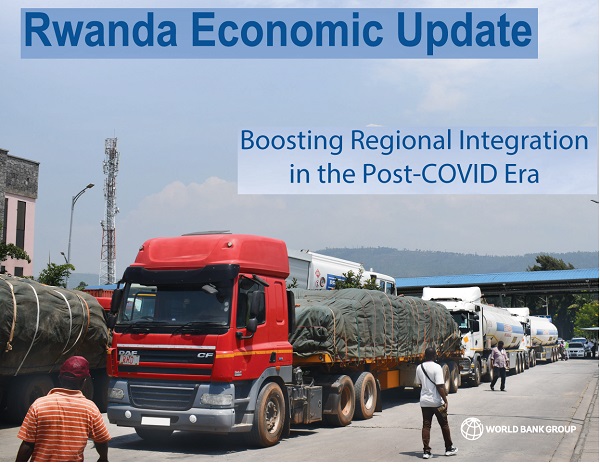

Rwanda has achieved a strong economic recovery in 2021, says the 18th edition of the Rwanda Economic Update report released on February 2,2020. Gross domestic product (GDP) increased by 11.1 percent in the first nine months of the year, reflecting a broad-based recovery from the 2020 recession. Industrial production expanded by 16.5 and agricultural output rose to 6.8 percent in the same year, while traditional exports (coffee, tea, cassiterite, wolfram, and coltan) increased by about 35 percent in the first nine months of 2021.
However, the report observes that the level of unemployment continued to deteriorate despite the recovery, as the growth acceleration partly reflected a shift in employment to higher-productivity activities (manufacturing and construction). While the GDP got close to the pre-pandemic level, the unemployment rate remained more than 13 percentage points above levels at the beginning of 2020, with female employment deteriorating.
“While the current recovery shows that Rwanda’s robust fiscal and medical responses to the crisis have had a notable impact on the economy, the government will need to continue its efforts to promote a more broad-based recovery that extends benefits to rural areas and protects the wellbeing of the most vulnerable members of society, including women” said Rolande Pryce, World Bank Country Manager.
In its special focus on Boosting Regional Trade Integration in the Post COVID Era, the report underscores the importance of sustained growth in trade as a key driver for Rwanda achieving its goal of becoming an upper middle-income country by 2035.
“Despite important progress, Rwanda has yet to fully achieve its trade potential with regional partners, notably, due to a relatively narrow export product base, discriminatory non-tariff barriers within the region, and persistent regional trade infrastructure gaps” said Calvin Djiofack, World Bank’s Senior Economist for Rwanda.
The REU18 notes that Rwanda has benefited from regional cooperation to reduce drastically its trade cost in recent years on both Central and Northern corridors, thus greatly facilitating its access to international markets. However, persistent security concerns among East Africa Community members, leading to temporary border closures, create uncertainties that impede trade and Rwanda’s potential as regional logistic hub.
Some of the actions proposed by the report for Rwanda to fully achieve its regional trade potential include: i) Developing a regional trade policy to foster industrialization and harness regional and continental opportunities; ii) implementing a new generation of trade facilitation and logistic reforms to further reduce trade costs; and iii) Developing an effective logistics hub to unlock regional opportunities.
